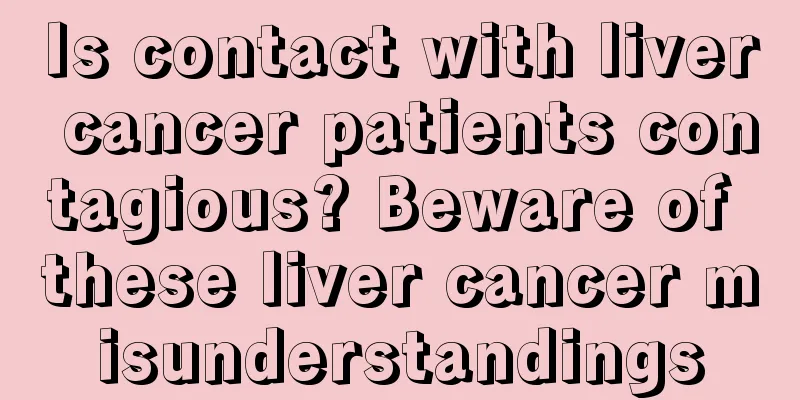Is contact with liver cancer patients contagious? Beware of these liver cancer misunderstandings

|
Liver cancer is a malignant disease that seriously threatens human health, so prevention and treatment are very important. However, many people have misunderstandings about how to prevent and treat liver cancer. Myth 1: All hepatitis will turn into liver cancer Hepatitis has a very broad meaning. Any inflammatory changes in the liver caused by any factor can be called hepatitis. However, the hepatitis people usually refer to is the hepatitis caused by the hepatitis virus. This type of hepatitis is contagious, so it is also called infectious hepatitis. Infectious hepatitis can be divided into five types: A, B, C, D, and E according to the different hepatitis viruses that cause it. In recent years, hepatitis G virus and post-transfusion hepatitis TTV virus have also been discovered. The pathogenicity of these two hepatitis viruses needs further study. Hepatitis A and E are of the same type. The patient's feces can excrete hepatitis virus, which can contaminate water and food and may lead to infection. However, this type of hepatitis can mostly heal on its own and generally will not turn into a chronic disease or even develop into hepatitis D virus. The condition of most hepatitis B patients worsens. It should be noted that the probability of hepatitis C developing into cirrhosis and liver cancer is higher than that of hepatitis B. Therefore, hepatitis C patients should actively seek treatment, work hard to strengthen their physical fitness, promote recovery, and prevent the transformation into cirrhosis and liver cancer. Myth 2: Contact with liver cancer patients can be contagious The process of patients infected with specific pathogens, such as bacteria, viruses and parasites, transmitting these pathogens to normal people through certain transmission routes is called infection, and the diseases caused by these pathogens are called infectious diseases. Liver cancer is a malignant disease in which the body's own cells undergo malignant transformation and abnormal proliferation. There are no pathogens excreted, so it is not an infectious disease and is not contagious. Some liver cancer patients develop jaundice, which is caused by damaged liver function or compression of the intrahepatic bile duct, not complicated by acute icteric hepatitis, so it is not contagious. Epidemiological survey data also confirm that people who have close contact with liver cancer patients are no more likely to develop liver cancer than those who have not. Therefore, there is generally no need to take special isolation measures for liver cancer patients, and people who have had contact with liver cancer patients do not need to be nervous or worried. However, it should be noted that since most liver cancers occur on the basis of hepatitis B, and hepatitis B can be transmitted through close contact. Therefore, people who have had close contact with liver cancer patients with hepatitis B can be vaccinated with hepatitis B vaccine when necessary to prevent the transmission of hepatitis B. Myth 3: If liver function is normal, it does not mean liver cancer Liver function test is an important basis for diagnosing hepatitis and cirrhosis, and it can sensitively reflect the degree of liver damage. In clinical practice, it is often seen that some liver cancer patients have normal liver function, so people wonder how normal liver function can be liver cancer? The liver of an adult weighs about 1500 grams and contains 250 billion liver cells. Liver cancer is different from hepatitis and cirrhosis. It is a localized lesion. Even if it is diffuse liver cancer, many small cancer nodules are diffusely distributed throughout the liver, and only a part of the liver cells have become cancerous, while the rest of the liver cells are still normal. Because the liver has a strong compensatory function, a part of the liver cells can replace the function of all liver cells, so the liver function test results of liver cancer patients can still be normal. Of course, liver function tests of liver cancer may be abnormal sometimes. This is mostly because liver cancer is also combined with active hepatitis or incompensated cirrhosis. There are also a few patients with advanced liver cancer, because the tumor occupies most of the liver, the remaining normal liver cells are very few, so that they cannot compensate for normal functions. It can be seen from this that liver cancer cannot be ruled out because of normal liver function, nor can liver cancer be diagnosed because of abnormal liver function. In fact, doctors test liver function of liver cancer patients to understand whether the patient has active hepatitis or cirrhosis, and to understand the degree of liver compensation, rather than to diagnose liver cancer. It is not advisable to take a lot of supplements after liver cancer surgery Many liver cancer patients often eat ginseng, soft-shelled turtle and other supplements to recover their physical strength as soon as possible after surgery. You should not eat too many nutritional supplements and supplements after liver cancer resection. Because these "high-quality" foods are not easy to decompose by the liver and will increase the burden on the liver. Clinically, the recurrence rate of liver cancer within two years after surgery is 62%~82%. To prevent recurrence, patients should strictly control their diet after surgery and be careful not to exercise excessively. In addition, from the perspective of traditional Chinese medicine, the liver is an emotional organ. Anger and depression can easily damage the liver. After surgery, patients should also pay attention to self-regulation and nourish their hearts and cultivate their nature. When the patient's physical strength gradually recovers, they can exercise moderately, but not too tired. Some recovered patients are often exhausted due to excessive exercise, resulting in swelling and pain in the liver area, ascites, etc. Therefore, it is best to exercise when you feel comfortable. Patients who have undergone liver cancer resection must "strategically despise liver cancer and tactically pay attention to recurrence". 2 to 4 weeks after resection, chemotherapy, radiotherapy or immunotherapy, as well as traditional Chinese medicine and other treatments are carried out according to the patient's physical condition. It is particularly important to note that patients should go to the hospital for regular checkups, such as AFp, liver function, and CT. It is best to have a checkup every 2 to 3 months within 1 to 2 years after surgery; every 3 to 6 months within 3 years; and every six months for more than 3 years. |
Recommend
How to remove acne on the face
It seems like acne on your face will never go awa...
What are the methods to remove facial wrinkles?
Many people develop wrinkles as they age or due t...
What should I do if I have diarrhea due to poor stomach? How can I solve it?
Many of our friends have sensitive stomachs and c...
Is moderate fasting healthy?
Young people nowadays are busy with their work, e...
Symptoms of arrhythmia, take it seriously
Arrhythmia is an important group of cardiovascula...
What to do if you are scratched by a cat
As our living standards are getting better and be...
What should be paid attention to in postoperative care for liver cancer? Four major issues to pay attention to in postoperative care for liver cancer
As our quality of life continues to improve, many...
What tests should be done for glioma
Glioma is a brain tumor disease that has no sympt...
Analysis of self-care for nasopharyngeal carcinoma radiotherapy
In recent years, nasopharyngeal carcinoma has bec...
Training methods to improve emotional intelligence
Many people have high IQs but not necessarily hig...
What kind of examinations should be done to check for liver cancer? Five examination items that liver cancer patients must know
Liver cancer is a relatively serious disease, and...
How is the effect of needle-free water light
Skin problems are issues that many women pay atte...
Pain three fingers below the navel
Pain three fingers below the navel may be caused ...
What anti-inflammatory medicine should I take when my feet are rubbed and pus is coming out
Many people suffer from bruises on their feet bec...
Symptoms and treatment of cervical cancer
Symptoms of cervical cancer include vaginal bleed...









